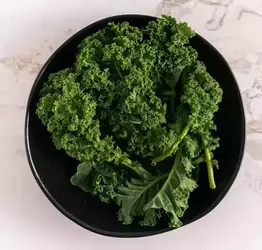Kale is a superfood that has many health benefits such as being rich in antioxidants, vitamins, minerals, and fiber.
It can help lower cholesterol, prevent cancer, and support your immune system. Kale is also versatile and can be eaten raw, cooked, or blended into smoothies and juices.
But does Kale make you bloated?

If yes then why does kale make you bloated? And what can you do to prevent or reduce it?
In this blog post, we will answer these questions and give you some tips on how to enjoy kale without feeling bloated.
Does Kale Make You Bloated?
Yes, Kale can make you bloated if you eat too much of it or don’t prepare it properly.
Kale contains FODMAPs, which are sugars that can cause gas and bloating in some people, especially those with irritable bowel syndrome (IBS).
To prevent or reduce bloating from kale, you can soak or sprout it before eating it, cook it well, eat smaller portions, chew thoroughly, and take probiotics.
Also, check Can Nuts Cause Bloating? Here’s what you need to know.
Why Does Kale Make You Bloated?
Kale belongs to the cruciferous family of vegetables, which also includes broccoli, cabbage, cauliflower, and Brussels sprouts.
These vegetables are rich in fiber and antioxidants, but they also contain sugars called FODMAPs (fermentable oligosaccharides, disaccharides, monosaccharides, and polyols).
FODMAPs are short-chain carbohydrates that are poorly absorbed in the small intestine and fermented by bacteria in the large intestine. This process produces gas, which can cause bloating, flatulence, cramping, and diarrhea in some people.
FODMAPs are especially problematic for people with irritable bowel syndrome (IBS), a common digestive disorder that affects up to 20% of the population.
People with IBS have a more sensitive gut and react more strongly to FODMAPs than others.
However, even healthy people can experience some discomfort from eating too much kale or other cruciferous vegetables.
How to Prevent or Reduce Bloating from Kale
If you love kale but hate feeling bloated after eating it, don’t worry. There are some things you can do to prevent or reduce bloating from kale.
Here are some tips:
#1 Eat smaller portions
Instead of eating a large salad or smoothie with kale, try eating smaller amounts throughout the day.
This will give your digestive system more time to process the fiber and reduce gas production.
#2 Chew well
Chewing helps break down the food into smaller pieces and mix it with saliva, which contains enzymes that start the digestion process.
Chewing also helps prevent swallowing air, which can contribute to bloating.
#3 Cook or blend kale
Cooking or blending kale can help soften its fibers and make it easier to digest.
It can also reduce some of the raffinose and glucosinolate content in kale. You can steam, sauté, roast, or bake kale or add it to soups, stews, casseroles, or stir-fries.
You can also blend kale into smoothies or juices with other fruits and vegetables.
#4 Add spices or herbs
Some spices or herbs can help improve digestion and reduce gas and bloating.
For example, ginger, turmeric, fennel seeds, peppermint leaves, and chamomile flowers have anti-inflammatory and carminative properties that can soothe your stomach and intestines.
You can add these spices or herbs to your kale dishes or drink them as teas before or after meals.
#5 Drink plenty of water
Water helps flush out toxins and waste from your body and keeps your digestive system hydrated and lubricated.
Water also helps prevent constipation, which can worsen bloating.
Aim to drink at least eight glasses of water per day or more if you exercise or sweat a lot.
#6 Soak or sprout your kale
Soaking or sprouting kale before eating it can help reduce the amount of FODMAPs and other anti-nutrients that can interfere with digestion.
To soak kale, simply chop it finely and place it in a bowl of water for a few hours or overnight. To sprout kale, soak the seeds for 8-12 hours, then rinse and drain them.
#7 Take probiotics
Probiotics are beneficial bacteria that live in your gut and help digest food, produce vitamins, and fight off harmful microbes.
Taking probiotics can help balance your gut flora and reduce bloating caused by FODMAPs. You can take probiotic supplements or eat fermented foods that contain natural probiotics, such as yogurt, kefir, sauerkraut, kimchi, or kombucha.
You can check Bio Salud Probiotic if you want to consider taking probiotics.
Summary
Kale is a nutritious and delicious vegetable that can offer many health benefits. However, it can also cause bloating in some people due to its high fiber content and its cruciferous nature.
To prevent or reduce bloating from kale, you can soak or sprout it before eating it, cook it well, eat smaller portions, chew thoroughly, and take probiotics
If you follow these tips, you may be able to enjoy kale without feeling bloated.
However, if you have persistent or severe bloating that interferes with your daily life or if you have other symptoms such as pain, nausea, vomiting, diarrhea, constipation, weight loss, or blood in your stool, you should consult with your doctor to rule out any underlying medical conditions that may be causing your bloating.
The Bottom Line
I hope this blog post was helpful and informative for you and it helped you learn whether Kale can make you bloated.
If you have any experience of bloating with Kale and tips on how to prevent it, feel free to share your experience in the comments below.
We would love to hear from you.
Thank you for reading and have a great day!




